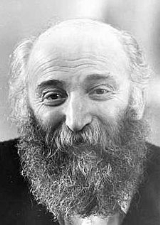
Gersh Budker
Encyclopedia
Gersh Itskovich Budker also named Alexander Mikhailovich Budker, (May 1, 1918 – July 4, 1977) was a Soviet nuclear physicist
.
He was appointed Corresponding Member of the Siberian branch of the Soviet Academy of Sciences
on March 28, 1958, and was made an Academician of the division of nuclear physics on June 26, 1964.
He is best known for his invention in 1968 of electron cooling
, a method of reducing the emittance of particle beams by thermalisation with a co-propagating electron beam.
Academician Budker was the founder (in 1959) and first Director of the Institute of Nuclear Physics
in Akademgorodok
, Russia
. His portrait decorates the famous Round Table room in the Institute. Following his death, the institute was renamed the Budker Institute for Nuclear Physics in his honour.
Budker died in Akademgorodok
from a heart attack
at 59.
Budker's life and works was celebrated in a collection of essays by his colleagues, including Pyotr Kapitsa
, Lev Landau
, and Andrei Sakharov
, and two by Budker himself. The collection, G. I. Budker: Reflections & Remembrances (edited by Boris N. Breizman) was published in 1988 and was later translated into English
by James W. Van Dam.
Nuclear physics
Nuclear physics is the field of physics that studies the building blocks and interactions of atomic nuclei. The most commonly known applications of nuclear physics are nuclear power generation and nuclear weapons technology, but the research has provided application in many fields, including those...
.
He was appointed Corresponding Member of the Siberian branch of the Soviet Academy of Sciences
Russian Academy of Sciences
The Russian Academy of Sciences consists of the national academy of Russia and a network of scientific research institutes from across the Russian Federation as well as auxiliary scientific and social units like libraries, publishers and hospitals....
on March 28, 1958, and was made an Academician of the division of nuclear physics on June 26, 1964.
He is best known for his invention in 1968 of electron cooling
Electron cooling
Electron cooling is a process to shrink the size, divergence, and energy spread of charged particle beams without removing particles from the beam. Since the number of particles remains unchanged and the space coordinates and their derivatives are reduced, this means that the phase space occupied...
, a method of reducing the emittance of particle beams by thermalisation with a co-propagating electron beam.
Academician Budker was the founder (in 1959) and first Director of the Institute of Nuclear Physics
Budker Institute of Nuclear Physics
The Budker Institute of Nuclear Physics is one of the major centres of advanced study of nuclear physics in Russia. It is located in the Siberian town Akademgorodok, on Academician Lavrentiev Avenue. The institute was founded by Gersh Itskovich Budker in 1959...
in Akademgorodok
Akademgorodok
Akademgorodok , is a part of the Russian city Novosibirsk, located 20 km south of the city center. It is the educational and scientific centre of Siberia...
, Russia
Russia
Russia or , officially known as both Russia and the Russian Federation , is a country in northern Eurasia. It is a federal semi-presidential republic, comprising 83 federal subjects...
. His portrait decorates the famous Round Table room in the Institute. Following his death, the institute was renamed the Budker Institute for Nuclear Physics in his honour.
Budker died in Akademgorodok
Akademgorodok
Akademgorodok , is a part of the Russian city Novosibirsk, located 20 km south of the city center. It is the educational and scientific centre of Siberia...
from a heart attack
Myocardial infarction
Myocardial infarction or acute myocardial infarction , commonly known as a heart attack, results from the interruption of blood supply to a part of the heart, causing heart cells to die...
at 59.
Budker's life and works was celebrated in a collection of essays by his colleagues, including Pyotr Kapitsa
Pyotr Kapitsa
Pyotr Leonidovich Kapitsa was a prominent Soviet/Russian physicist and Nobel laureate.-Biography:Kapitsa was born in the city of Kronstadt and graduated from the Petrograd Polytechnical Institute in 1918. He worked for over ten years with Ernest Rutherford in the Cavendish Laboratory in Cambridge...
, Lev Landau
Lev Landau
Lev Davidovich Landau was a prominent Soviet physicist who made fundamental contributions to many areas of theoretical physics...
, and Andrei Sakharov
Andrei Sakharov
Andrei Dmitrievich Sakharov was a Soviet nuclear physicist, dissident and human rights activist. He earned renown as the designer of the Soviet Union's Third Idea, a codename for Soviet development of thermonuclear weapons. Sakharov was an advocate of civil liberties and civil reforms in the...
, and two by Budker himself. The collection, G. I. Budker: Reflections & Remembrances (edited by Boris N. Breizman) was published in 1988 and was later translated into English
English language
English is a West Germanic language that arose in the Anglo-Saxon kingdoms of England and spread into what was to become south-east Scotland under the influence of the Anglian medieval kingdom of Northumbria...
by James W. Van Dam.
External links
- Johnsen K., Gersh Budker, Nature, Volume 270, Issue 5636, pp. 459 (1977)
- Caskets on Parade

